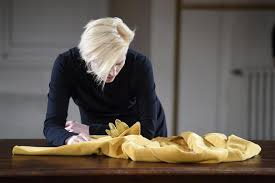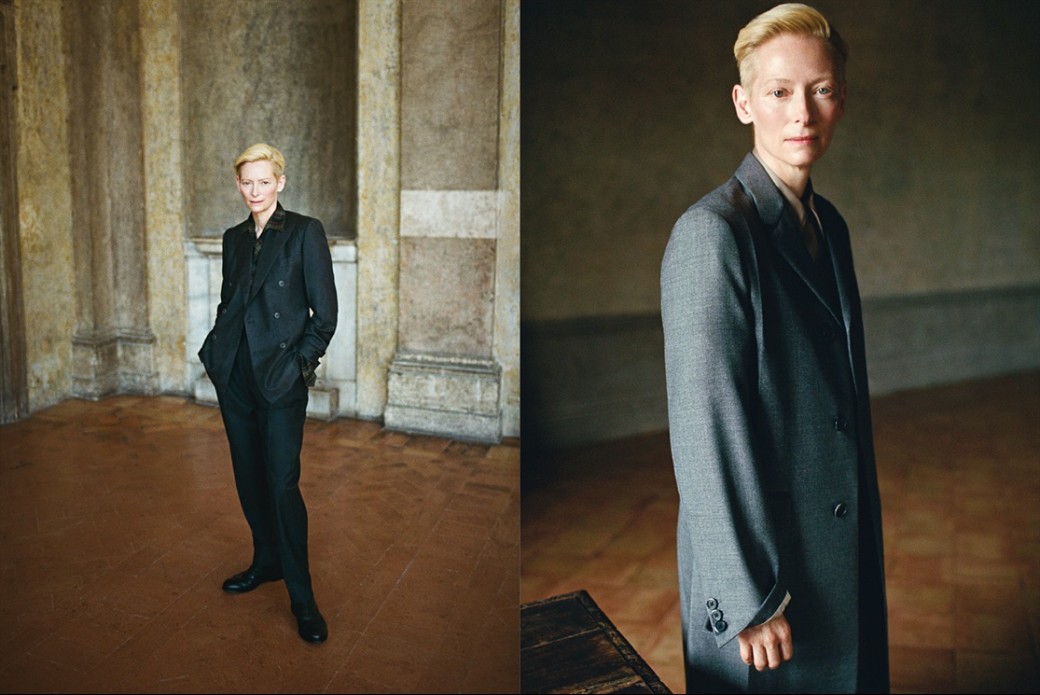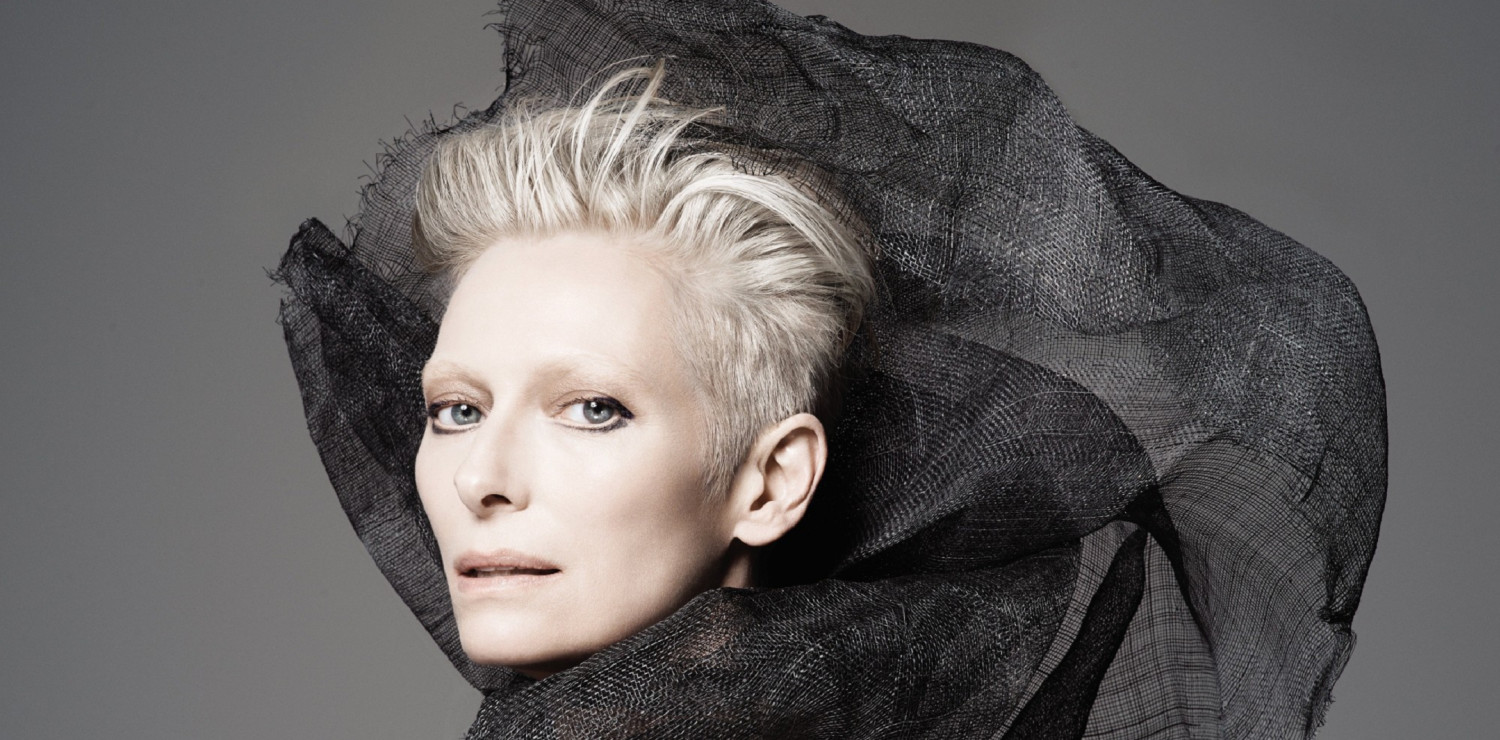The elegance of Tilda
Interview with British actress Tilda Swinton, starring in the latest film by Luca Guadagnino
Tilda Swinton. One of God’s images, if you think of God as a woman. There’s no actress in the world who expresses, as she does, elegance, class, audacity, anti-conformism and genius. And passion. She is composed, as precise as a melody on a harpsichord, like a mathematical equation. She is, at the same time, capable of acts of incredible courage. She remains composed, like a statue made of light, with her supernaturally white skin. She was at university when Derek Jarman, painter and film-maker, the maddest and most radical on the British scene, saw her. When he met someone for the first time, Jarman used to film them in super8. He did the same with Tilda and said to his assistant, “Oh, my God. I’ve found her”. He had found not only the protagonist of Caravaggio, but six of his films. Such a long and vital collaboration – with Edward II Tilda won the Volpi Cup in Venice in 1992 – would not have existed if Tilda had not been special. If she had not privileged human relations above all else. “When I choose a film, the project comes later. First, there’s the director”. She worked with Jarman even when he was dying, exhausted by Aids; when there was no more money and to make ends meet, she found herself betting on horse races. Art, cinema and beauty came before all else.
The darkness passed, there was an Oscar for her fantastic interpretation of the corrupt, gelid social climber legal consultant in Michael Clayton, who tries to hide the tsunami of defeat under a mask of cold self-control. Among the most intelligent directors, many have wanted her: Jim Jarmusch, Tim Roth, David Fincher and Wes Anderson. Some will remember her as the White Witch in the Chronicles of Narnia. For her, it was probably just a parenthesis. She gave her magnificent face to mainstream cinema only on rare occasions. Tilda came to Florence last spring. With a small, exclusive project: Cloakroom, one of the Pitti Uomo 2015 events. It was a performance dedicated to the closet: a little temple that holds our clothes for a few hours, a part of us. A little world that survives only in the theatres.
At the Pergola theatre, Tilda Swinton welcomed the guests and like a true cloakroom attendant, she invited them to leave a garment. With those clothes, she improvised a show composed of gestures, embracing coats and scarves, mixing overcoats and shawls, caressing their spirits. With her, Olivier Saillard, director of Musée Galliera in Paris. The actress already had intense relations with fashion, as testimonial for Coco Chanel and, for Italy, for Pomellato. But the new chapter of her love affair with Italy, passes through Venice. At the Film Festival last September, she presented A Bigger Splash by Luca Guadagnino. A Bigger Splash is the remake of a film from the 1960s, La piscine by Jacques Deray, with Alain Delon and Romy Schneider. The story is a tangle of desire, seduction and recrimination in the blinding sunlight of Sicily that is already almost in Africa. Tilda Swinton, in this context that recalls Antonioni’s films, is a rock star who has lost her voice and cannot speak. In the whole film, she utters only three hoarse words and one strong and piercing shout.
 The British diva, on stage at the Teatro della Pergola in Florence on the occasion of Pitti Uomo, improvises herself as a wardrobe designer in a show-performance conceived by Olivier Saillard that recounts fashion between sacredness and irony
The British diva, on stage at the Teatro della Pergola in Florence on the occasion of Pitti Uomo, improvises herself as a wardrobe designer in a show-performance conceived by Olivier Saillard that recounts fashion between sacredness and ironyTilda, whose idea was it for a character who can’t speak?
With Luca we often speak. Sometimes these conversations become a film, sometimes not. The film was born right when Luca accepted my suggestion that Marianne not speak. In that period, I myself did not feel like speaking. My mother had died recently, my words could not get out.
Your character is a rock star. And in one of the scenes, she appears in a crowded stadium. It was the stadium of a real rock concert. What effect did it have on you, to shoot in front of forty thousand people?
Vasco Rossi was very generous to give us his public to shoot a scene. Obviously, I was not in the least prepared for it. It was something completely out of the ordinary for someone who works in films or the theatre. I was worried. But the fans were very sweet. They could have whistled at me, but they didn’t!
In the film, which was shot at Lampedusa, there are many references to migrants. What do you think of the migrants, what is your position?
I wish that everyone, the press and the people, would stop calling them migrants: they are war refugees. This says a lot about their condition and the position we should take.
 Tilda Swinton
Tilda SwintonWhat do you think of your career today?
I often find myself feeling guilty because I am not really an actress. I don’t feel like a professional, even if I have made many films in the last thirty years. I have never tried to enter the cinema industry, and I still feel like an outsider. I don’t have a career. I have a life. I follow my life and the films end up in my life.









